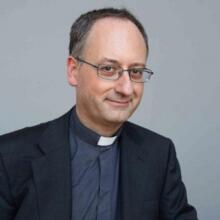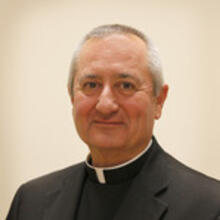The word discernment has a central, even critically important place in the development of “The Joy of Love,” Pope Francis’ post-synodal apostolic exhortation on the family. In referring to discernment, Francis employs very strong language: “It is reductive simply to consider whether or not an individual’s actions correspond to a general law or rule because that is not enough to discern and ensure full fidelity to God in the concrete life of a human being” (No. 304, our italics). Many failures to understand this important magisterial text arise precisely from an inability to understand what discernment is and to live it out. So to understand and appreciate the document, we need an accurate understanding of discernment—a word cited about 50 times in the document—and the serious challenge it poses for pastoral ministry.
“The Joy of Love” outlines a real and genuine “pastoral conversion”: “We have long thought that simply by stressing doctrinal, bioethical and moral issues, without encouraging openness to grace, we were providing sufficient support to families, strengthening the marriage bond and giving meaning to marital life. We find it difficult to present marriage more as a dynamic path to personal development and fulfillment than as a lifelong burden. We also find it hard to make room for the consciences of the faithful, who very often respond as best they can to the Gospel amid their limitations, and are capable of carrying out their own discernment in complex situations. We have been called to form consciences, not to replace them” (No. 37, our italics).
The great question, obviously, is this: How do we form consciences? And how do we form those who are called to and responsible for the formation of consciences?
Discernment seems to be a key word in the magisterium of Pope Francis. He lives his Petrine ministry as an evangelical, spiritual and pastoral ministry of discernment, which is able to foster an adult Christianity. “Discernment, purification, and reform” (“The Joy of the Gospel,” No. 30) establish a tripartite foundation. Discernment drives the mission forward and pushes those engaged in it to move outside of themselves and not to be afraid of being dirtied by the “mud on the street” (Nos, 45, 179).
On June 16, the pope spoke at the opening of the gathering of the Diocese of Rome about “The Joy of Love.” He affirmed the need “to stay in touch with the movement of the Spirit in discernment.” This means “listening to what God is saying to us within our given circumstances” of life. Discernment “does not stop with a description of situations or of problems or—even less—of sin.” Rather, it “always goes beyond and succeeds in seeing behind every face, every story, and every situation an opportunity and a possibility.” Discernment “protects us from turning faith into an ideology.”
Discerning, then, means listening to the voice of the Spirit and facing our unfolding history with its needs and challenges, and—above all—with an eye on individual persons and their concrete lives. This means moving beyond “abstract situations” and “cases.” When Pope Francis spoke to the Jesuits of Civiltà Cattolica in June 2013, he synthesized the matter in this way: “Try to discover what God has accomplished and how he will continue his work.” To do this, “the necessary [elements] are study, sensitivity, and experience,” but you also need “to keep your mind and heart open and to avoid the spiritual ailment of self-referral.”
Clearly, discernment means following one’s own conscience with courage. “This does not mean following my own ego, or doing what I am interested in, or what I find convenient, or what I like” (Angelus address, 6/30/13). Rather, conscience is that interior space where I hear what is true, what is good, what is of God; it is that interior place of my relationship with God. And there God speaks to my heart and helps me to discern and to understand the road that I need to follow. Once I have made a decision, God helps me to go forward and to remain faithful to it.
The pope generously draws on both Scripture and the tradition to identify the goal of discernment. It is to know the will of God in the particular circumstances of my life, so that I may embrace it and live it as best as I can. The assumption—and this is very important for the understanding of discernment—is that there is not only a “generic” or universal will of God, but there is also a particular and specific way that God’s will is imprinted in my life with my personality, with my circumstances and with my unique vocation.
Beyond Problem Solving
Discernment is not a form of diagnosis or problem solving or moral casuistry, as valid as these operations might be in a given context. Their goal, however, differs from that of discernment. Diagnosis, for example, pinpoints a pathology for which a remedy is prescribed in order to effect a cure. Problem solving uses rational powers to arrive at a solution. And casuistry breaks through moral complexities and applies principles to identify the right way to act. In each of these operations, there is a clear before and after. In a given moment, the diagnosis, the problem solving and the moral analysis yields resolution. With discernment it is otherwise.
The fundamental presupposition of discernment is that it deals not with a problem but rather with a life in process, a person who is on a journey to God. Discernment then sorts through the stages and dimensions of that journey to identify where and how God is inviting that person or community to conversion and life. Instead of dealing with a discrete moment or event, discernment is attentive to the ongoing movements of soul and spirit in all their particularities and historical unfolding.
“The Joy of Love” poses a significant difficulty for some readers, who insist in a pastoral context on dealing exclusively with the binary division of “state of grace” and “state of sin.” Of course, there is a state of grace and a state of sin, because we can be in a loving relationship with God. And that means God’s indwelling or sanctifying grace. Alternately, we can be in a state of sin or alienation from God. An emphasis on the “state” of a person or family or marriage, however, situates people by definition in a static position.
This static emphasis fails to regard the dynamism of the Christian spiritual journey even within those states. For example, I may be in the state of grace and growing in my relationship with God. And that is to be desired. But I may also be in the state of grace and negligent in such a way that the quality of that relationship is eroding and may even become susceptible to rupture. I may be in a state of sin and continue the downward spiral of alienation. But I may be in a state of sin with nudges of actual grace that little by little push me toward repentance and a conversion of heart.
Discernment and accompaniment presume that the Christian life, including the Christian life lived out in marriage and families, is a journey. Even when that journey is irregular or imperfect—perhaps especially when that is the case—the persons who belong to those families and marriages need discernment and accompaniment. There is also another foundation for discernment and accompaniment, especially in difficult situations. It is what Pope Francis calls “the logic of mercy.” He says:
It is a matter of reaching out to everyone, of needing to help each person find his or her proper way of participating in the ecclesial community and thus to experience being touched by an “unmerited, unconditional and gratuitous” mercy. No one can be condemned forever, because that is not the logic of the Gospel! Here I am not speaking only of the divorced and remarried but of everyone in whatever situation they find themselves” (“The Joy of Love, No. 297).
Pope Francis’ affirmation is striking. Because of God’s mercy, we are never left in the lurch, never abandoned and certainly never discarded. If that is the way of God, then it must also be the way of the church. Furthermore, if that is the way of the church, then it means the ministers of the church must offer accompaniment and discernment for those who are on the journey, no matter what their situation. Spiritual direction is the help that a believer gives to other believers to help them achieve the level of self-knowledge and freedom that will enable them to become themselves in faith.
Watching, Waiting, Observing
Because we live in a mechanized and technological world, we expect to find applications that will quickly resolve our problems and situations. We are impatient with anything less than that. Even our most intimate interpersonal relationships are overshadowed by our impatient quest for quick fixes. In the realm of the Spirit of God, it is different.
A pivotal assumption is that the call of God and the will of God are inscribed in the narrative of our lives. In effect, God’s truth and direction for us is embedded in our very existence. We also believe that if we wait and watch patiently, God’s truth and direction will emerge with sufficient clarity for us to embrace it and live it.
More specifically, in the accompaniment of married couples and families, we watch and wait in and through a process of attentive listening to those entrusted to our care, as we listen simultaneously to the word of God. First, we listen to others integrally—that is, not only their problems, difficulties or dilemmas but also, and even more, to their gifts, dreams and hopes. This integral listening helps us to be present and attentive to whole person, the whole marriage and the whole family. Then, if we are serious about identifying God’s call and will in the lives of people, we must also be listening simultaneously to the word of God given in the Scriptures and in the teaching of the church.
After the process of waiting and watching for a God-given direction to emerge and after a clarification of the particular call to conversion or change is identified, we are summoned to a response, a decision and a commitment. This is, in effect, an exercise of our freedom. And it might seem that it is only a question of doing the right thing. Of course, that ought to be the direction of our response and decision. The complication rests in the nature of our freedom. We are never absolutely free in this life. Pope Francis affirms this when he states: “Situated freedom, real freedom [which belongs to us], is limited and conditioned. It is not simply the ability to choose what is good with complete spontaneity” (“The Joy of Love,” No. 273). The first objective of the accompaniment of spiritual direction is to confront a person with the degree of freedom that he has, and help him to grow in it.
Along with helping individuals, couples and families to make the free decisions to which God is calling them, those who exercise spiritual accompaniment need to help them identify the sustaining resources that will lead them into the future. The dialogue involved in discernment does not come to an end but opens out into a future. And that future includes a continuing process of waiting, watching, observing, deciding and responding. No one can ever rest because they feel that they are in a “correct” situation. God’s call is to ongoing conversion until the conversion of heart is complete.
It would be foolish to think that individuals engage in discernment within the private confines of their lives as a solitary enterprise. Discernment and the decisions of conscience are absolutely personal in character, but they are not private matters isolated from the community of faith. Spiritual direction itself has always been viewed as an ecclesial event, the meeting of two believers in the name of the Lord Jesus (see Mt 18:20). In the context of family and marriage, Pope Francis offers these striking words: “The church is a family of families, constantly enriched by the lives of all [the] domestic churches” (No. 87).
The Results of Discernment
The concluding paragraph of “The Joy of Love” suggests that the entire exhortation has not simply been about family life and marriage but, even more, that it represents a commitment of the whole church to accompany families. This is the fundamental context of discernment.
The journey of discernment that is made “walking together” draws not only on the resources of other believers today. It also draws on the history of faith, on the experiences of the holy men and women of our tradition, as well as the supportive and encouraging presence of those who serve in the church today.
The result of an honest and true discernment is the “good fruit” of which the Gospel speaks (see Lk 6:43-45): “each tree is known by its own fruit.” And since the core of the Gospel is love, an authentic discernment will be manifest and evident in the love it generates, love of God and love of one another. Another authenticating sign of discernment, whether for individuals or for communities, is the gift of peace. This peace, however, must be properly understood. The genuine peace that is a fruit of true discernment is not simply an atmosphere of calm; even less is it complacency. This true peace is rooted in right relationship with God and with others. This true peace summons people to a continuing conversion.
Finally, it is critically important to understand the relationship between discernment and hope. For some people the passionate quest for proper discernment is linked to their search for certitude. They want to know God’s will for them with precision. Presumably, with this knowledge they can then accomplish God’s will and be certain that they are pleasing to God.
But the certitude of salvation is not given to us in this life. We must take seriously the words of Paul: “For in hope we were saved.” (Rom 8:24) We cannot have absolute certitude about our processes of discernment, whether in our personal spiritual journey or regarding questions of marriage and family life. This conclusion may appear to some to be disconcerting and disheartening. But it need not be so. On the contrary, it summons us to an act of trust and confidence, not in ourselves but in God. It is the same confidence about which St. Paul wrote to the Philippians: “I am confident of this, that the one who began a good work among you will bring it to completion by the day of Jesus Christ” (Phil 1:6).








